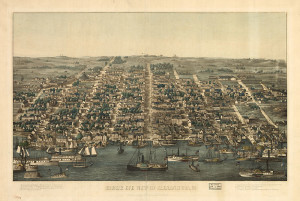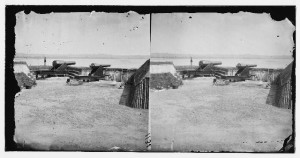After the defeat of the Army of the Cumberland at Chickamauga and its retreat back into Chattanooga, President Lincoln was very much involved in the decisionsto send reinforcements General Rosecrans in Chattanooga. In the midst of the crisis Mr. Lincoln proclaimed the lifting of the blockade of Alexandria just down the Potomac from the Executive Mansion.
From The Papers And Writings Of Abraham Lincoln, Volume Six:
PROCLAMATION OPENING THE PORT OF ALEXANDRIA, VIRGINIA,
SEPTEMBER 24, 1863.
BY THE PRESIDENT OF THE UNITED STATES OF AMERICA:
A Proclamation.
Whereas, in my proclamation of the twenty-seventh of April, 1861, the ports of the States of Virginia and North Carolina were, for reasons therein set forth, placed under blockade; and whereas the port of Alexandria, Virginia, has since been blockaded, but as the blockade of said port may now be safely relaxed with advantage to the interests of commerce:
Now, therefore, be it known that I, Abraham Lincoln, President of the United Sates, pursuant to the authority in me vested by the fifth section of the act of Congress, approved on the 13th of July, 1861, entitled “An act further to provide for the collection of duties on imports, and for other purposes,” do hereby declare that the blockade of the said port of Alexandria shall so far cease and determine, from and after this date, that commercial intercourse with said port, except as to persons, things, and information contraband of war, may from this date be carried on, subject to the laws of the United States, and to the limitations and in pursuance of the regulations which are prescribed by the Secretary of the Treasury in his order which is appended to my proclamation of the 12th of May, 1862.
In witness whereof, I have hereunto set my hand, and caused the seal of the United States to be affixed.
Done at the city of Washington, this twenty-fourth day of September in the year of our Lord one thousand eight hundred and sixty-three, and of the independence of the United States the eighty-eighth.
A. LINCOLN.
By the President WILLIAM H. SEWARD,
Secretary of State.
Mary Todd Lincoln was up in New York City at this time and her husband sent her a few telegrams assuring her that the D.C. air was healthy and so it would be safe for her to return. Here’s an example:
TELEGRAM TO MRS. LINCOLN.
EXECUTIVE MANSION, WASHINGTON, September 22, 1863.
MRS. A. LINCOLN, Fifth Avenue House, New York:—Did you receive my despatch of yesterday? Mrs. Cuthbert did not correctly understand me. I directed her to tell you to use your own pleasure whether to stay or come, and I did not say it is sickly and that you should on no account come. So far as I see or know, it was never healthier, and I really wish to see you. Answer this on receipt.
A. LINCOLN.
Washington was healthy; Alexandria was back open for business; but Chickamauga was still making its effects felt. 150 years ago today President Lincoln telegraphed Mary the news that her brother-in-law had been killed during the battle:
MRS. LINCOLN’S REBEL BROTHER-IN-LAW KILLED
TELEGRAM TO MRS. LINCOLN.
WAR DEPARTMENT, SEPTEMBER 24, 1863
MRS. A. LINCOLN, Fifth Avenue Hotel, New York:
We now have a tolerably accurate summing up of the late battle between Rosecrans and Braag. The result is that we are worsted, if at all, only in the fact that we, after the main fighting was over, yielded the ground, thus leaving considerable of our artillery and wounded to fall into the enemy’s hands., for which we got nothing in turn. We lost in general officers one killed and three or four wounded, all brigadiers, while, according to the rebel accounts which we have, they lost six killed and eight wounded: of the killed one major-general and five brigadiers including your brother-in-law, Helm; and of the wounded three major-generals and five brigadiers. This list may be reduced two in number by corrections of confusion in names. At 11.40 A.M. yesterday General Rosecrans telegraphed from Chattanooga: “We hold this point, and I cannot be dislodged except by very superior numbers and after a great battle.” A despatch leaving there after night yesterday says, “No fight to-day.”
A. LINCOLN.
It is written that after the brother-in-law’s death the Lincolns had his widow Emilie (Mary’s step-sister) live with them at the White House.
“A return to normalcy” was a campaign slogan of Warren G. Harding during the 1920 American presidential campaign.



